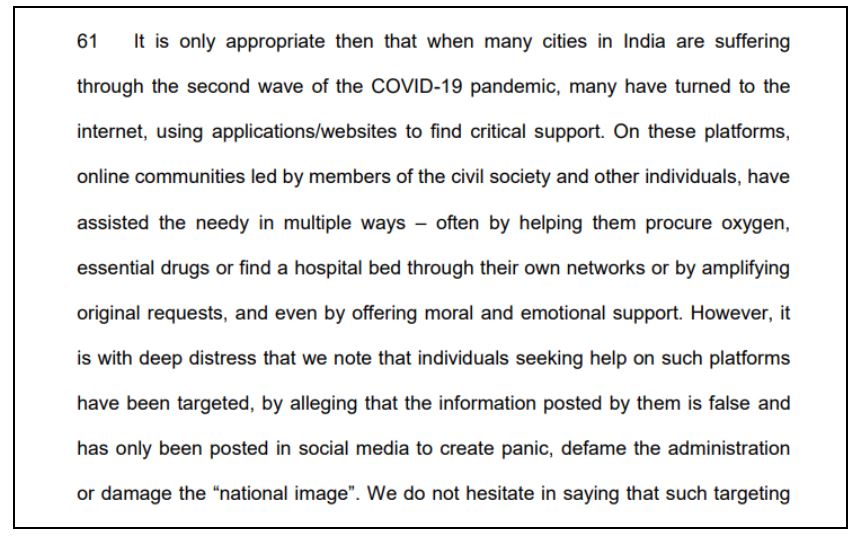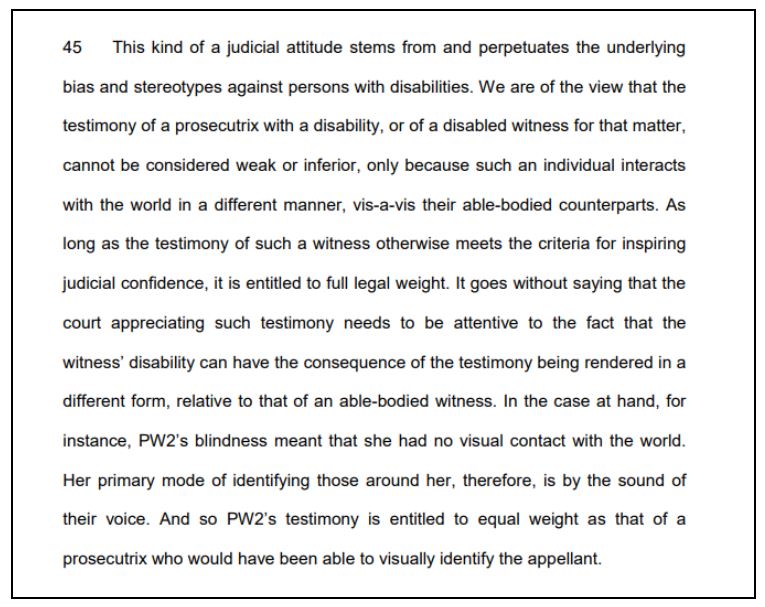In this roundup court judgements, we look at constitutional courts’ remarks on various aspects of the COVID-19 crisis such as oxygen shortage at hospitals, non-availability of medicines, and coercive actions against SOS calls. We also look at apex court directions on how the testimony of a person with a disability cannot be considered weak or inferior and directions to Insurance companies to communicate the decision on authorization for cashless treatment for COVID-19 claims within 60 minutes.
Supreme Court: Don’t Clampdown on Citizens’ SOS Calls for Medical Help through Social Media
In taking suo moto cognizance of the present COVID-19 situation in the country, the supreme court issued a set of recommendations and directed the state and central governments to act in an efficient and inclusive manner.
Taking note of the unprecedented humanitarian crisis in the country, following the outbreak of the COVID-19 pandemic, the apex court issued notices to the Union Government, State Governments, and Union Territories. To increase the availability of oxygen and ensure transparency of demand-supply management, the court directed the Central Government to consider the following suggestions:
- A Virtual Central Control Room that displays the allocation of supply of oxygen by the Central Government to each State/UT. By extension, a mechanism for displaying real-time updates of the supply of oxygen from each State to hospitals in each district, along with the remaining stock of oxygen with the hospitals may be maintained and shared with the citizens to ensure transparency. This will also ensure that citizens can easily identify the hospitals where medical aid can be availed.
- The government shall clarify the steps being taken on planning on the use of oxygen concentrators to reduce the demand for Liquid Medical Oxygen (LMO) since LMO is needed only for critical patients. A comprehensive plan on augmenting the production/import of these oxygen concentrators may be considered.
- The expected supply of oxygen/containers to be received from outside India should be suitably augmented to cater to anticipated increases in the demand and shortfall of domestic availability.
- A review shall be made of any restrictions on inter-State travel of trucks or tankers carrying oxygen/other medical aid equipment (such as GST-related issues, documentation) which might cause a hindrance in their movement. The Central Government may consider implementing a system to track and map the supply tankers which would allow better management of resources and allow diversion of resources from one State to the other in case of emergencies.
Further, the apex court directed the Central Government to clarify the following issues in order to ensure the protection of the fundamental rights to equality and to life and personal liberty for all persons who are eligible to take the vaccine from 01 May 2021:
- Whether the Central and State Governments have introduced any initiatives for ensuring the immunization of persons who do not have access to digital resources as otherwise the mandatory requirement of registration over the Co-WIN digital portal.
- Since the Central Government commits to vaccinating persons over 45 years, free of cost, in view of their vulnerability, whether walk-in facilities for vaccination will continue for these persons after 01 May 2021.
- Whether the Central or State Governments propose to undertake targeted vaccination drives for persons who are providing on-ground assistance during the second wave of the pandemic – such as crematorium workers, who were not considered as Frontline or Healthcare workers for Phase 1 of the vaccination drive.
- Whether, and if so what, steps being undertaken by INYAS (Indian National Young Academy of Sciences), the nationwide mass awareness campaign for COVID-19 vaccination, for ensuring outreach in rural areas and socio-economically underprivileged sections of society including the possibility of using mobile vans, vehicles and railways to vaccinate such people as well as those living in remote areas, near their doorsteps so as to minimize their travel and potential infection with COVID-19. Efforts must also be made that a lack of identity proof does not create a hindrance in the process of immunization of all individuals, specifically, the underprivileged.
- Whether the Central government will revisit its policy by procuring 100% of the doses which can then be equitably disbursed to the State Governments.
- Since the vaccine administration is now to be a shared responsibility of the Union and the States, the Central Government and the State Governments shall provide- (a) a breakup of the current and projected availability of vaccine stocks for the next 6 months; and (b) a timeline for achieving immunization of the newly eligible 59 crore persons who are aged between 18-44 years.

The court also took notice of the fact that several critical drugs, used to treat COVID-19, such as Remdesivir and Tocilizumab, are being sold at significantly inflated prices or in fake form. In order to clamp down on this practice, the judgement recommends that the Central Government can consider constituting a special team to identify and prosecute those who: (a) sell medical grade oxygen/COVID-19 medicines at exorbitant prices; and (b) sell fake substances and recover the concerning substances. A protocol for ambulances must also be evolved to avoid citizens being exploited by extracting unconscionable charges. The Central Government can consider creating a platform for easy reporting and redressal of such cases.

The court also expressed deep regret that individuals seeking help on social media platforms have been targeted, by alleging that the information posted by them is false and has only been posted on social media to create panic, defame the administration or damage the “national image”. The apex court directed the Central Government and State Governments to ensure that they immediately cease any direct or indirect threats of prosecution and arrest to citizens who air grievances or those that are attempting to help fellow citizens receive medical aid. The court also instructed that all Directors General of Police shall ensure compliance down the ranks of the police forces within their jurisdictions.

Supreme Court: Testimony of a prosecutrix with a disability, or of a disabled witness, cannot be considered weak or inferior.
In the case Patan Jamal Vali vs. State of Andhra Pradesh, the apex court issued guidelines to make criminal justice system more disabled-friendly.
While hearing an appeal filed by the sole accused tried for the offence of sexual violence against a woman with a disability, the court strongly affirmed that the testimony of a prosecutrix with a disability, or of a disabled witness for that matter, cannot be considered weak or inferior, only because such an individual interacts with the world in a different manner, vis-à-vis their able-bodied counterparts.

The judgement noted that work still needs to be done in order to make our criminal justice system more disabled-friendly and issued the following guidelines:
- The National Judicial Academy and state judicial academies are requested to sensitize trial and appellate judges to deal with cases involving survivors of sexual abuse. It should also cover guidance on the legal weight to be attached to the testimony of such witnesses/survivors. Public prosecutors and standing counsel should also undergo similar training in this regard. The Bar Council of India can consider introducing courses in the LL.B. program that explain the intersectional nature of violence.
- Trained special educators and interpreters must be appointed to ensure the effective realization of the reasonable accommodations embodied in the Criminal Law Amendment Act, 2013. All police stations should maintain a database of such educators, interpreters and legal aid providers, in order to facilitate easy access and coordination.
- The National Crimes Record Bureau should seriously consider the possibility of maintaining disaggregated data on gender-based violence. The disability must be one of the variables based on which such data must be maintained so that the scale of the problem can be mapped out and tailored remedial action can be taken.
- Police officers should be provided sensitization, on a regular basis, to deal with cases of sexual violence against women with disabilities, in an appropriate way. The training should cover the full life cycle of a case involving a disabled survivor, from enabling them to register complaints, obtain necessary accommodations, medical attention and suitable legal representation. This training should emphasize the importance of interacting directly with the disabled person concerned, as opposed to their caretaker or helper, in recognition of their agency.
- Awareness-raising campaigns must be conducted, in accessible formats, to inform women and girls with disabilities, about their rights when they are at the receiving end of any form of sexual abuse.
Delhi HC: Insurance companies to communicate their approvals to the concerned hospitals within 30-60 minutes.
In pursuance of important COVID-19 related matters, the Delhi high court also directed the Insurance Regulatory and Development Authority of India (IRDAI) to issue immediate instructions to insurance companies/their agents to ensure no delay in giving approvals for discharge of COVID-19 patients who are covered by insurance policies.
The judgement emphasises on the following instructions to be followed by insurance companies:
- Insurance companies/their agents to communicate their approvals to the concerned hospitals/establishments within a maximum time period of 30 to 60 minutes, in order to ensure that the discharge of the patients is not delayed in any manner.
- Once a patient is ready for discharge and while the attendant of the patient is waiting for the discharge slip to be processed, the hospitals/establishments can, instead of holding up the bed, process the new admission on that bed so that the bed does not remain unoccupied and needy patients are immediately given admission for their treatment.
Following these directions, the IRDAI has also issued relevant norms to all the insurance providers.
The judgement also took note of the shortage of Remdesivir and the struggle of the general public to find hospital beds in time. The high court issued a slew of directions and instructed the state government to develop an online portal, providing information on the availability of vacant beds capable of providing oxygen treatment. Observing that the portal is being developed, the high court directed that instead of routing all the drugs through the hospitals or other medical establishments, the patient/family member/attendant of the patient should be allowed to put in a request in the portal for obtaining the Remdesivir, along with the following details:
- Name of the patient
- Name of the hospital where the patient is admitted (prescription of the hospital would also be uploaded)
- COVID-19 positive report
- Aadhaar number of the patient (copy of Aadhar card be uploaded)
- Name and mobile no. of the patient/family member/attendant who would be making the payment and taking delivery of the drug.
In dealing with another set of pleas concerning oxygen shortage of hospitals, the high court directed the state government to file an affidavit providing the status of liquid and gaseous oxygen and refillers and also directed the oxygen refillers to provide data on the government’s portal. The bench also orally observed that “We will also have to compensate these people for dying due to lack of oxygen. It’s the responsibility of the State.”
Featured Image: Important Court Judgements


